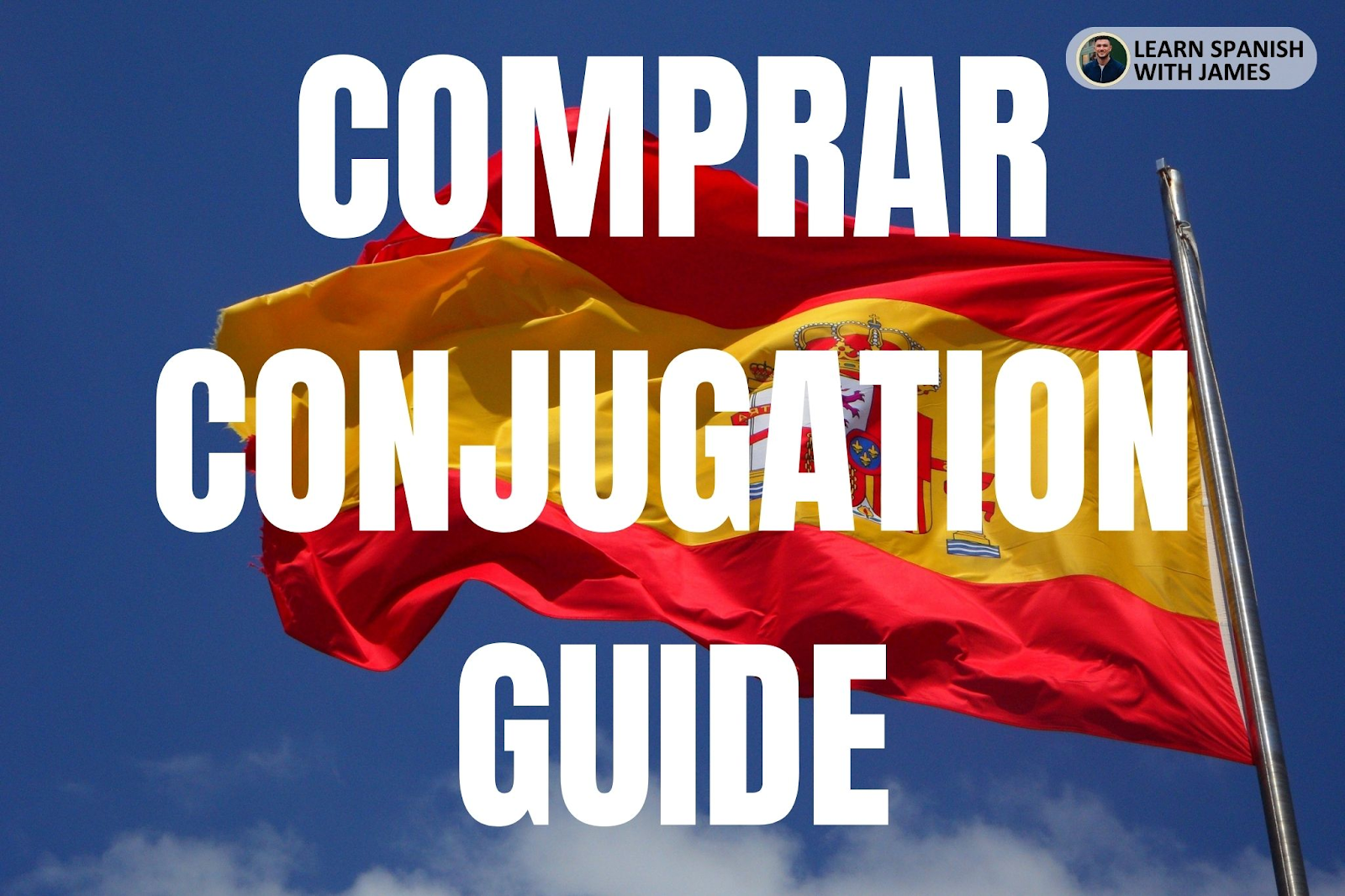Comprar Conjugation Chart & Full Tense Guide

The Spanish verb “comprar” means “to buy”.
It is one of the most important Spanish verbs to learn from a beginner level. And it’s easy to learn, because “comprar” is a regular -AR verb.
I’m James, from Learn Spanish With James. In this verb guide, we’ll cover the conjugation of the Spanish verb “comprar” in all its forms and for all pronouns, from the infinitive “comprar” to its various conjugations in different tenses and moods, with a verb chart for each tense.
Present Tense
| Pronouns | Pronombres | Conjugation |
|---|---|---|
| I | yo | compro |
| you | tú | compras |
| he,she,it, you(formal) | él,ella,usted | compra |
| we | nosotros,nosotras | compramos |
| you pl. | vosotros, vosotras | compráis |
| they, you pl. (formal) | ellos,ellas,ustedes | compran |
When We Use Present Tense
The present tense in Spanish is used to describe actions that are currently happening, habitual actions, and general truths.
In the case of the regular verb “comprar,” which means “to buy,” the present tense is used to express current actions of buying.
Examples of “Comprar” in the Present Tense
- Yo compro pan todos los días. (I buy bread every day.)
- Tú compras ropa nueva para la fiesta. (You buy new clothes for the party.)
- Él/ella compra regalos para sus amigos. (He/she buys gifts for his/her friends.)
- Nosotros compramos en este mercado. (We buy at this market.)
- Vosotros compráis entradas para el cine. (You all buy movie tickets.)
- Ellos/ellas compran libros en la librería. (They buy books at the bookstore.)
Preterite Tense
| Pronouns | Pronombres | Conjugation |
|---|---|---|
| I | yo | compré |
| you | tú | compraste |
| he, she. it, you (formal) | él, ella, usted | compró |
| we | nosotros, nosotras | compramos |
| you (plural) | vosotros, vosotras | comprasteis |
| they, you (pl. formal) | ellos, ellas, ustedes | compraron |
When We Use Preterite Tense
The preterite tense in Spanish is used to describe actions that were completed at a specific point in the past.
When conjugating “comprar” in the preterite tense, it indicates buying that occurred and ended in the past.
Example sentences below provide examples of this tense in action.
Examples of “Comprar” in the Preterite Tense
- Yo compré un regalo para mi madre ayer. (I bought a gift for my mother yesterday.)
- Tú compraste comida en el supermercado. (You bought food at the supermarket.)
- Él/ella compró un boleto de avión la semana pasada. (He/she bought a plane ticket last week.)
- Nosotros compramos una casa el año pasado. (We bought a house last year.)
- Vosotros comprasteis souvenirs en la playa. (You all bought souvenirs at the beach.)
- Ellos/ellas compraron entradas para el concierto. (They bought tickets for the concert.)
Imperfect Tense
| Pronouns | Pronombres | Conjugation |
|---|---|---|
| I | yo | compraba |
| you | tú | comprabas |
| he, she, it, you (formal) | él, ella, usted | compraba |
| we | nosotros, nosotras | comprábamos |
| you (plural) | vosotros, vosotras | comprabais |
| they, you(pl. formal) | ellos, ellas, ustedes | compraban |
When We Use Imperfect Tense
Next, it’s the imperfect tense. In Spanish, this tense describes past actions that were ongoing or habitual.
When we conjugate “comprar” in the imperfect tense, we are talking something habitual or ongoing in the past.
For example, “I was buying” and “I used to buy” – these are both examples of the imperfect tense in Spanish.
Examples of “Comprar” in the Imperfect Tense
- Yo compraba dulces cuando era niño. (I used to buy sweets when I was a child.)
- Tú comprabas frutas en el mercado cada sábado. (You used to buy fruits at the market every Saturday.)
- Él/ella compraba ropa en esa tienda todas las semanas. (He/she used to buy clothes at that store every week.)
- Nosotros comprábamos libros para leer en el parque. (We used to buy books to read in the park.)
- Vosotros comprabais helados en verano. (You all used to buy ice cream in summer.)
- Ellos/ellas compraban regalos para sus padres en Navidad. (They used to buy gifts for their parents at Christmas.)
Future Tense
| Pronouns | Pronombres | Conjugation |
|---|---|---|
| I | yo | compraré |
| you | tú | comprarás |
| he,she,it, you(formal) | él,ella,usted | comprará |
| we | nosotros,nosotras | compraremos |
| you pl. | vosotros, vosotras | compraréis |
| they, you pl. (formal) | ellos,ellas,ustedes | comprarán |
When We Use Future Tense
The future tense in Spanish is used to express actions that will occur in the future. I have highlighted “will” because this is the literal translation, e.g. “I will buy”.
Don’t confuse this with the conditional tense, which I’ll come on to shortly.
Examples of How to Conjugate “Comprar” in the Future Tense
- Yo compraré un coche nuevo el próximo mes. (I will buy a new car next month.)
- Tú comprarás un regalo para tu amigo mañana. (You will buy a gift for your friend tomorrow.)
- Él/ella comprará comida para la fiesta el fin de semana. (He/she will buy food for the party on the weekend.)
- Nosotros compraremos boletos para el concierto. (We will buy tickets for the concert.)
- Vosotros compraréis una casa en el futuro. (You all will buy a house in the future.)
- Ellos/ellas comprarán muebles para su apartamento. (They will buy furniture for their apartment.)
The Conditional Tense
| Pronouns | Pronombres | Conjugation |
|---|---|---|
| I | yo | compraría |
| you | tú | comprarías |
| he,she,it, you(formal) | él,ella,usted | compraría |
| we | nosotros,nosotras | compraríamos |
| you pl. | vosotros, vosotras | compraríais |
| they, you pl. (formal) | ellos,ellas,ustedes | comprarían |
When We Use the Conditional Tense
The conditional tense in Spanish is used to express actions that would happen under certain conditions or to express polite requests or hypothetical situations.
When conjugating “comprar” in the conditional tense, we indicate buying that would occur under specific conditions.
Top Tip: Learn how to use the conditional tense with the imperfect subjunctive for top speaking marks!
Examples of the Conditional Spanish Verb Conjugation for “Comprar”
- Yo compraría un regalo si tuviera dinero. (I would buy a gift if I had money.)
- Tú comprarías esa casa si fueras rico. (You would buy that house if you were rich.)
- Él/ella compraría un barco si viviera cerca del mar. (He/she would buy a boat if he/she lived near the sea.)
- Nosotros compraríamos un avión si fuéramos millonarios. (We would buy a plane if we were millionaires.)
- Vosotros compraríais más ropa si tuvierais espacio en el armario. (You all would buy more clothes if you had space in the closet.)
- Ellos/ellas comprarían un perro si no fueran alérgicos. (They would buy a dog if they weren’t allergic.)
The Preterite Perfect Tense
| Pronouns | Pronombres | Auxiliary verb ‘haber’ | Past Participle |
|---|---|---|---|
| I | yo | he | comprado |
| you | tú | has | comprado |
| he,she,it, you(formal) | él,ella,usted | ha | comprado |
| we | nosotros,nosotras | hemos | comprado |
| you pl. | vosotros, vosotras | habéis | comprado |
| they, you pl. (formal) | ellos,ellas,ustedes | han | comprado |
When We Use Pretérite Perfect Tense
The perfect tense, known in Spanish as “el pretérito perfecto” is used to express actions that have occurred recently or actions that have a connection to the present.
We conjugate “comprar” in the perfect tense to indicate buying that has happened recently or has relevance to the present.
I am providing some examples below.
Examples of “Comprar” in the Perfect Tense
- Yo he comprado un regalo para mi hermana. (I have bought a gift for my sister.)
- Tú has comprado un nuevo teléfono celular. (You have bought a new mobile phone.)
- Él/ella ha comprado un coche usado. (He/she has bought a used car.)
- Nosotros hemos comprado una casa en las afueras de la ciudad. (We have bought a house on the outskirts of the city.)
- Vosotros habéis comprado muebles nuevos para el apartamento. (You all have bought new furniture for the apartment.)
- Ellos/ellas han comprado entradas para el partido de fútbol. (They have bought tickets for the soccer match.)
The Pluperfect Tense
| Pronouns | Pronombres | Auxiliary verb ‘haber’ | Past Participle |
|---|---|---|---|
| I | yo | había | comprado |
| you | tú | habías | comprado |
| he,she,it, you(formal) | él,ella,usted | había | comprado |
| we | nosotros,nosotras | habíamos | comprado |
| you pl. | vosotros, vosotras | habíais | comprado |
| they, you pl. (formal) | ellos,ellas,ustedes | habían | comprado |
When We Use the Pluperfect Tense
The pluperfect tense in Spanish is used to express actions that had occurred before another past action.
We conjugate “comprar” in the pluperfect tense to indicate buying that had occurred before another past event.
It is formed with the conjugated forms of the auxiliary verb haber and the past participle “comprado.”
For example, “I had bought” – “había comprado“.
Examples of “Comprar” in the Pluperfect Tense
- Yo había comprado el libro antes de la conferencia. (I had bought the book before the conference.)
- Tú habías comprado la comida antes de que llegaran los invitados. (You had bought the food before the guests arrived.)
- Él/ella había comprado el regalo antes de la fiesta. (He/she had bought the gift before the party.)
- Nosotros habíamos comprado los billetes de avión antes de la cancelación del vuelo. (We had bought the plane tickets before the flight cancellation.)
- Vosotros habíais comprado los ingredientes para la cena cuando comenzó la tormenta. (You all had bought the ingredients for dinner when the storm started.)
- Ellos/ellas habían comprado los boletos de tren antes de saber del cierre de la estación. (They had bought the train tickets before knowing about the station closure.)
The Future Perfect Tense
| Pronouns | Pronombres | Auxiliary verb ‘haber’ | Past Participle |
|---|---|---|---|
| I | yo | habré | comprado |
| you | tú | habrás | comprado |
| he,she,it, you(formal) | él,ella,usted | habrá | comprado |
| we | nosotros,nosotras | habremos | comprado |
| you pl. | vosotros, vosotras | habréis | comprado |
| they, you pl. (formal) | ellos,ellas,ustedes | habrán | comprado |
When We Use The Future Perfect Tense
The future perfect tense in Spanish is used to express actions that will have been completed at a certain point in the future.
Below are some examples of how to conjugate “comprar” in the future perfect tense.
Examples of “Comprar” in the Future Perfect Tense
- Yo habré comprado todos los regalos para Navidad antes de diciembre. (I will have bought all the Christmas gifts before December.)
- Tú habrás comprado la comida para la fiesta antes de que lleguen los invitados. (You will have bought the food for the party before the guests arrive.)
- Él/ella habrá comprado un nuevo teléfono celular para entonces. (He/she will have bought a new cell phone by then.)
- Nosotros habremos comprado una casa nueva para el próximo año. (We will have bought a new house by next year.)
- Vosotros habréis comprado todo lo necesario para el viaje antes de partir. (You all will have bought everything necessary for the trip before leaving.)
- Ellos/ellas habrán comprado los boletos de avión antes de la fecha límite. (They will have bought the plane tickets before the deadline.)
The Conditional Perfect Tense
| Pronouns | Pronombres | Auxiliary verb ‘haber’ | Past Participle |
|---|---|---|---|
| I | yo | habría | comprado |
| you | tú | habrías | comprado |
| he,she,it, you(formal) | él,ella,usted | habría | comprado |
| we | nosotros,nosotras | habríamos | comprado |
| you pl. | vosotros, vosotras | habríais | comprado |
| they, you pl. (formal) | ellos,ellas,ustedes | habrían | comprado |
When We Use The Conditional Perfect Tense
The conditional perfect tense in Spanish allows us to express actions that would have been completed under certain conditions in the past.
Again, I have provided example sentences of this tense below.
Top Tip: Read the sentences I have provided below to learn how to use this tense with the imperfect subjunctive.
Examples of “Comprar” in the Conditional Perfect Tense
- Yo habría comprado un regalo si hubiera tenido dinero. (I would have bought a gift if I had had money.)
- Tú habrías comprado esa casa si hubieras encontrado un trabajo mejor. (You would have bought that house if you had found a better job.)
- Él/ella habría comprado un barco si hubiera tenido tiempo para navegar. (He/she would have bought a boat if he/she had had time to sail.)
- Nosotros habríamos comprado más comida si hubiera habido espacio en la nevera. (We would have bought more food if there had been space in the fridge.)
- Vosotros habríais comprado los billetes de tren si hubiera habido plazas disponibles. (You all would have bought the train tickets if there had been available seats.)
- Ellos/ellas habrían comprado regalos si hubieran recordado la fecha. (They would have bought gifts if they had remembered the date.)
The Present Subjunctive Tense
| Pronouns | Pronombres | Conjugation |
|---|---|---|
| I | yo | compre |
| you | tú | compres |
| he,she,it, you(formal) | él,ella,usted | compre |
| we | nosotros,nosotras | compremos |
| you pl. | vosotros, vosotras | compréis |
| they, you pl. (formal) | ellos,ellas,ustedes | compren |
When We Use The Present Subjunctive Tense
This one is tricky and cannot be explained with just one paragraph.
Just know for now that the present subjunctive tense in Spanish is used to express desires, doubts, wishes, or possibilities in the present or future.
Examples of “Comprar” in the Present Subjunctive Tense
- Yo quiero que tú compres frutas frescas. (I want you to buy fresh fruits.)
- Es importante que él/ella compre un seguro de viaje. (It’s important for him/her to buy travel insurance.)
- Ojalá que nosotros compremos los boletos antes de que se agoten. (Hopefully, we’ll buy the tickets before they sell out.)
- Sugiero que vosotros compréis productos orgánicos. (I suggest you all buy organic products.)
- Dudo que ellos/ellas compren el coche sin hacer una prueba de manejo. (I doubt they’ll buy the car without test-driving it.)
The Imperfect Subjunctive Tense
| Pronouns | Pronombres | Conjugation |
|---|---|---|
| I | yo | comprara, comprase |
| you | tú | compraras, comprases |
| he,she,it, you(formal) | él,ella,usted | comprara, comprase |
| we | nosotros,nosotras | compráramos, comprásemos |
| you pl. | vosotros, vosotras | comprarais, compraseis |
| they, you pl. (formal) | ellos,ellas,ustedes | compraran, comprasen |
When We Use The Imperfect Subjunctive Tense
The imperfect subjunctive tense in Spanish is used to express desires, doubts, wishes, or possibilities in the past.
I am providing examples below.
Examples of “Comprar” in the Imperfect Subjunctive Tense
- Yo quería que tú comprases ese vestido para la fiesta. (I wanted you to buy that dress for the party.)
- Esperábamos que él/ella comprara los ingredientes correctos para la receta. (We hoped he/she would buy the right ingredients for the recipe.)
- Era necesario que nosotros compráramos los boletos con anticipación. (It was necessary for us to buy the tickets in advance.)
- Recomendábamos que vosotros compraseis una casa en lugar de alquilar. (We recommended you all to buy a house instead of renting.)
- Preferíamos que ellos/ellas compraran los regalos juntos. (We preferred that they bought the gifts together.)
Affirmative Imperative
| Pronouns | Pronombres | Conjugation |
|---|---|---|
| you | tú | ¡compra! |
| he,she,it, you(formal) | él,ella,usted | ¡compre! |
| we | nosotros,nosotras | ¡compremos! |
| you pl. | vosotros, vosotras | ¡comprad! |
| they, you pl. (formal) | ellos,ellas,ustedes | ¡compren! |
When We Use The Affirmative Imperative
The affirmative imperative in Spanish is used to give commands or instructions in a direct and affirmative manner (as the name suggests!)
In this case, you’re instructing someone to make a purchase!
Examples of the Affirmative Imperative “Comprar” Conjugation
- ¡Compra el pan en la panadería! (Buy the bread at the bakery!)
- ¡Compremos entradas para el concierto! (Let’s buy tickets for the concert!)
- ¡Comprad regalos para todos! (Buy gifts for everyone!)
- ¡Compre usted ese libro! (Buy that book!)
- ¡Compren ustedes frutas y verduras frescas! (Buy fresh fruits and vegetables!)
Negative Imperative
| Pronouns | Pronombres | Conjugation |
|---|---|---|
| you | tú | ¡no compres! |
| he,she,it, you(formal) | él,ella,usted | ¡no compre! |
| we | nosotros,nosotras | ¡no compremos! |
| you pl. | vosotros, vosotras | ¡no compréis! |
| they, you pl. (formal) | ellos,ellas,ustedes | ¡no compren! |
When We Use The Negative Imperative
The imperative negative mood in Spanish is used to give commands or instructions in a direct and negative manner (again, as the name suggests!)
Examples of the Negative Imperative “Comprar” Conjugation
- ¡No compres ropa cara! (Don’t buy expensive clothes!)
- ¡No compremos más de lo necesario! (Let’s not buy more than necessary!)
- ¡No compréis productos de mala calidad! (Don’t buy low-quality products!)
- ¡No compre usted en esa tienda! (Don’t buy in that store!)
- ¡No compren ustedes sin comparar precios primero! (Don’t buy without comparing prices first!)
Online Spanish Courses & Grammar Courses
For a full list of Beginner, Intermediate and Advanced Courses, check out this full list of online Spanish courses.
I put this list together myself, and it comprises a mixture of courses that offer Spanish grammar practice for all levels, conversational practice, listening and writing exercises in Spanish, free Spanish courses, and a whole lot more.
The fastest way to learn Spanish is to test a mixture of Spanish resources and choose the course that coincides most with your learning style.
In addition to online Spanish courses, on this site you will find a wide range of Spanish podcasts, Spanish apps, Spanish YouTube channels, and both online and physical Spanish language schools.

About James – Or Should that be Santiago?
My name is James. I am a Brit with a love for the Spanish language. I have lived in Spain, Argentina, and Costa Rica, and I have been teaching Spanish for over a decade. This site will show you how to master the elements of Spanish grammar that often dishearten learners. I hope you enjoy the site and find it useful.
If you are interested in taking your Spanish to the next level, check out the Courses section for a full list of the Spanish courses I suggest. All reviews are based on my personal opinions.







